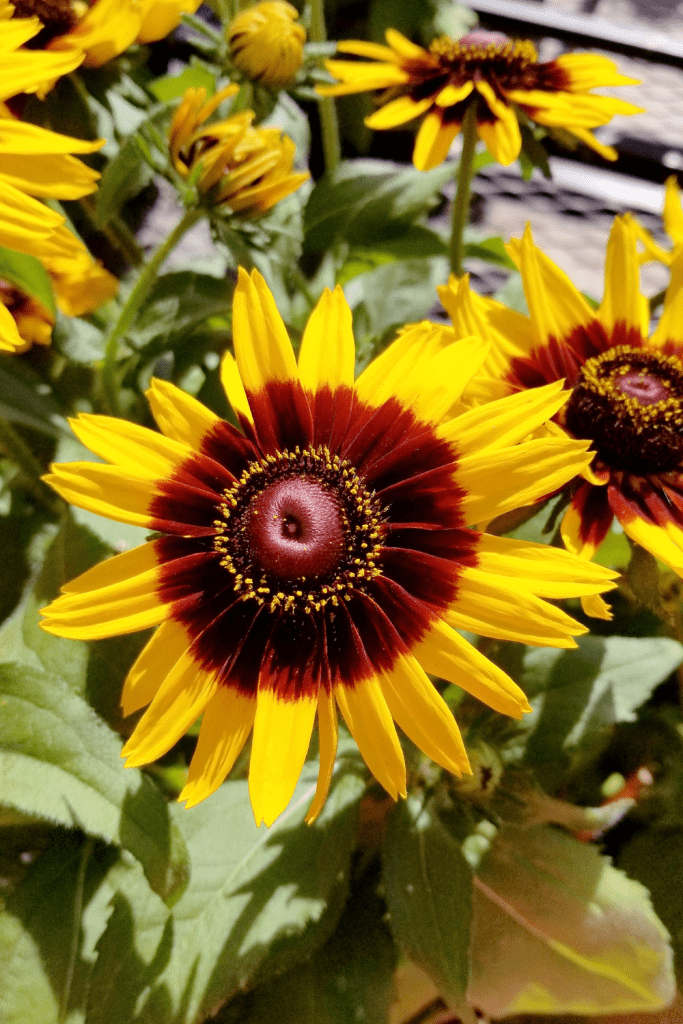When it comes to choosing plants for your garden, perennial flowers are often a top choice. Let’s take a closer look at the question: are Denver daisies perennial plants?

This hardy perennial come back year after year, making the Denver daisy rudbeckia a cost-effective and low-maintenance perennial for any gardener. One popular perennial flower is the Denver daisy, also known as rudbeckia hirta or black-eyed susan.
What are Denver Daisies?
Denver daisies are a type of tender perennial flower that belong to the Asteraceae family. They are native to North America and can be found growing in most regions of the continent.
These flowers are characterized by their petals of purest yellow with big mahogany-red eye, giving them a striking resemblance to their namesake, the sunflower.
The Denver daisy was named for the 150th anniversary of the City of Denver. These large golden-yellow daisies make great cut flowers in a cutting garden.
How to Grow the Denver Daisy Black Eyed Susan
If you’re interested in adding these beautiful flowers to your garden, here are some tips on how to grow them successfully:

Soil Requirements
Denver daisies prefer well-drained soil that is rich in organic matter. They can tolerate a wide range of soil pH levels, but neutral to slightly acidic soil is ideal.
Make sure the soil is loose and not compacted, as this can prevent proper root growth.
Watering
These flowers have average water needs and should be watered regularly to keep the soil moist. However, be careful not to overwater them, as excessive moisture can lead to root rot.
It’s best to water at the base of the plant rather than overhead, as this can prevent the leaves from getting wet and potentially developing fungal diseases.
Sun Exposure
Rudbeckia ‘Denver daisy’ thrive in full sun, meaning they should receive at least 6 hours of direct sunlight per day. If you live in a hotter climate, partial shade during the afternoon can benefit the plants and prevent them from wilting or drying out.

Fertilization
These plants are not heavy feeders, but they can benefit from a light application of fertilizer in the spring. Use an all-purpose fertilizer or one specifically formulated for flowering plants, and follow the instructions on the package for proper application.
Propagation Requirements
Denver daisies can be propagated through both seeds and division. The best time to divide the plants is in early spring when new growth appears. To propagate from seeds, sow them in a well-draining potting mix and keep them lightly moist until they germinate.
Other Facts about Denver Daisies
- These flowers are deer resistant and rabbit resistant, making them a great option for gardens where deer are known to frequent.
- This showy plant attracts pollinators such as bees and butterflies, making them beneficial for the overall health of your garden.
- Denver daisies make an outstanding cut flower and add a bright pop of color to any floral arrangement or sunny border in a garden.
- They are considered low maintenance plants, making them ideal for beginner or busy gardeners.

Are Denver Daisies Perennial FAQs
Keep reading for some great questions you may have about are Denver daisies perennial plants.
Do Denver Daisy come back every year?
Yes, Denver Daisies are typically perennial plants. Perennials are plants that live for more than two years, and they often bloom in the spring and summer, go dormant in the fall and winter, and then return the following growing season.
Perennials like Denver Daisies can add long-lasting color and interest to a garden, coming back year after year. It’s important to note that while they are generally considered perennials, the specific conditions of your garden, climate, and care practices can influence the longevity and performance of the plants.
Do Denver daisies like sun or shade?
When it comes to their preferred sunlight conditions, Denver Daisies tend to thrive in full sun. These flowers typically require at least 6 to 8 hours of direct sunlight per day to grow and bloom successfully.
So, if you want to cultivate Denver Daisies, it’s essential to provide them with the right amount of sunlight to ensure their healthy growth.

How long does Denver Daisy bloom?
Denver Daisies are not naturally perennial; they are typically considered annual flowers. The duration of their blooming period can vary, but generally, they produce vibrant blooms from late spring to early fall.
This means that you can enjoy their colorful display for several months during the growing season, making them a lovely addition to your garden or landscape while they are in bloom. However, their blooming period may be influenced by factors such as local climate and growing conditions.
Are Denver daisies and black eyed Susans the same?
Yes, the Denver Daisy is a variety of black-eyed Susan (Rudbeckia hirta). The term “black-eyed Susan” is a common name for various flowering plants in the Rudbeckia genus, and Denver Daisy is a specific cultivar within this genus.
It is known for its bright yellow flowers with a dark brown or black central disk, which gives it the characteristic “black-eyed” appearance. If you have Denver Daisy in your garden, you are indeed growing a type of black-eyed Susan.

Are Denver Daisies Perennial Plants Conclusion
In conclusion, Denver daisies are beautiful perennial flowers that are easy to grow and come back year after year. With their striking appearance and low maintenance requirements, they are a great addition to any cut flower garden.
So why not add some Denver daisies to your garden and enjoy their bright blooms for years to come?
